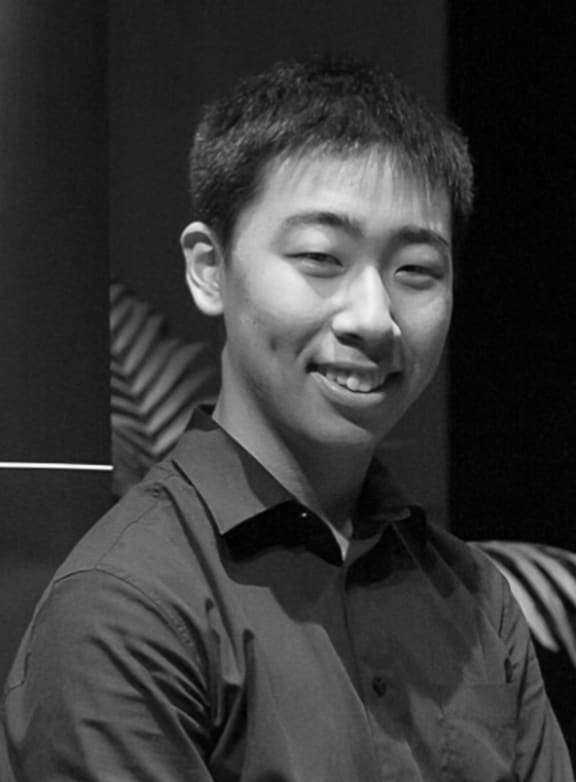
Henry Meng, pianist. Second prize winner at the 2023 National Concerto Competition Photo: Supplied/publisher
Henry Meng, pianist
Second place at the 2023 National Concerto Competition in Christchurch
Hello, my name is Henry Meng and I am a student at the University of Auckland. I have been musical since an early age, playing the piano and composing while under the guidance of Rae de Lisle and Stephen de Pledge. I have made many appearances in concerts and competitions in soloist, chamber musical, orchestral, and compositional settings.
It is my compositional instinct that draws me toward the vivid, sophisticated musical tapestries that composers Rachmaninoff are capable of writing.
Rachmaninoff is one of my favourite composers. His best output consistently contains vibrantly expressive artistry of a high emotional saturation; opulent, lush textures permeate his work, which brings a transcendent level of multifacetedness quintessentially representative of that precarious era in classical musical history where chromatic music reached its peak. Rachmaninoff writes such emotionally provocative musical lines, in expertly manipulating complex harmonies—as well as crafting extravagantly long melodies—to produce deeply touching moments as found in works such as this one, his second Piano Concerto, and the eighteenth variation of his Rhapsody on a Theme by Paganini, which will actually be played by a fellow pianist in this concert.
This Concerto changed my life. It is notorious for being one of the most difficult works in the standard pianistic repertoire, but I play it chiefly because it is, above all else, beautiful. I have never been more emotionally affected by a work of music. Shortly after I became obsessed with it so many years ago, I promised myself I would play the entire thing with an orchestra—and now, having had the miraculous luck to clear both the preliminary and semi-final stages of this competition, I can finally realise my wish—with you.
- Henry Meng
Sergei Rachmaninoff
Piano Concerto No. 3 in D minor
Allegro ma non tanto
Intermezzo – Adagio
Finale – Alla breve
Performed by Henry Meng (piano) with the Christchurch Symphony Orchestra, conducted by Benjamin Northey in the Douglas Lilburn Auditorium of the Christchurch Town Hall, 18 March, 2023
Sergei Rachmaninoff’s third piano concerto was written in 1909. At this time, Maurice Ravel had just finished writing Gaspard de la Nuit, an upstart Igor Stravinsky was busy working on The Firebird, and Nicholas II was Tsar of the Russian Empire.
After the wild 1901 success of his second Piano Concerto, the intervening eight years between this and the Third saw the composition of twenty-seven songs, two sonatas and operas each, ten Preludes, and his second Symphony, among other things. Next came this mammoth creation.
Listen to the reflective, introverted melody that I play to open the piece. Rachmaninoff was one who buried musical figures and elements—motifs—into his work. They are yours to find—for example, after I finish the melody, the orchestra picks it up for themselves. Notice the emotional inflections and transfigurations. Some are subtle—shifts from nostalgic longing to nostalgic catharsis—while others build from insistent self-questioning to dark moodiness to resolute anger. All this builds into a cadenza—a period of unaccompanied piano, here with thunderous, tumultuous chords. We end the first movement quietly, in a moment of inward purposefulness.
In the second movement, a mournful, weeping melody from the strings sets the tone, while the pianist soon turn it into a wistful remembrance of cherished memories. Stormier parts follow, yet none of them are angry; they are the screams of one collapsing in the tears they cry.
Russians live among some of the most brutal winters in any inhabited place on Earth. I am convinced that this endurance, and the dogged tenacity their culture must have to remain living where they do, is reflected in the third movement of this work. You’ll hear it when it starts—a recalcitrant, boisterous, unabashedly obstinate part that starts after two dramatic chords by the orchestra and myself, together. A playful section serves as an intermediary between this intense opening section and its later reinstatement; listen for the re-arrival of this, as it is the beginning of the conclusion.
The work finishes with an extended passage of chords for me; consider this the high point of the entire Concerto, demanding the absolute maximum from the orchestra and myself. We finish with a bellicose, valiant statement that against all odds, victory will eventually be found.

